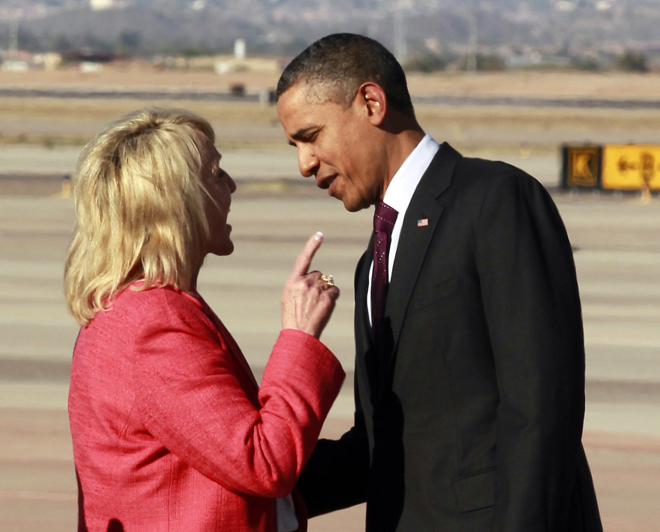Lest anyone think the Supreme Court is done playing with political dynamite this year: Next up, the Obama administration asks the justices to quash Arizona’s immigration law, a measure that has sparked intense protests, boycotts and even rap songs.
The high court will hear oral arguments Wednesday on whether the state’s tough law — which permits police to check people’s legal status during lawful encounters, and makes it a crime to look for work without legal status — passes the constitutional test. Lower courts have sided with the administration and blocked its key provisions.
“This should be an easy case for the federal government,” said Adam Winkler, a professor at UCLA School of Law. “Under longstanding precedent, the federal government has plenary authority over immigration. Yet here Arizona has imposed its own view of how immigration law should be enforced.”
The core legal question is the extent to which states are empowered to make immigration laws, a turf constitutionally reserved for the federal government. The administration argues that Arizona’s law coerces it to take a harder line on undocumented immigrants. Gov. Jan Brewer’s legal team frames the statute as an effort to cooperatively assist the federal government in dealing with an immigration system that is widely regarded as broken.
The case has important implications for the 2012 election, as Hispanic voters, a key constituency, strongly reject the law. Mitt Romney has spoken out against the government’s legal challenge but is also distancing himself from the law itself, an equivocation Obama has seized on to paint his opponent as sympathetic to racial profiling.
The most controversial part of the law allows police to demand to see evidence of a person’s legal status during lawful encounters, even unrelated to immigration, if they perceive the individual to be an undocumented immigrant. Civil rights groups warn that the law will primarily burden Hispanics, even those who are in the state legally.
Politically, Romney is walking a tight rope: It’s not clear he can appease Hispanics without agitating the restrictionist elements of the conservative base, whose votes he is also relying on. Obama’s campaign will be able to tout a rebuke of the law as a huge victory on behalf of Hispanics; a pro-Arizona decision would be a major setback for the president, but it would be risky for Romney to endorse such a ruling regardless.
Polls suggest the general public is supportive of Arizona’s law, largely out of frustration with Congress’s failure to reform the nation’s immigration system. Similar laws in five other states — Alabama, Georgia, Indiana, South Carolina and Utah — could be affected by the ruling.
The case will be argued by U.S. Solicitor General Donald Verrilli and, on the side of Arizona, famed D.C. lawyer Paul Clement — a rematch after the two squared off in health care arguments. Justice Elena Kagan, who was Obama’s solicitor general when the lawsuit was filed, has recused herself. The remaining eight justices will decide how much of the law can stand. A 4-4 tie would affirm the Ninth Circuit Court of Appeals’ ruling against its key provisions. The decision is expected by the end of June.






